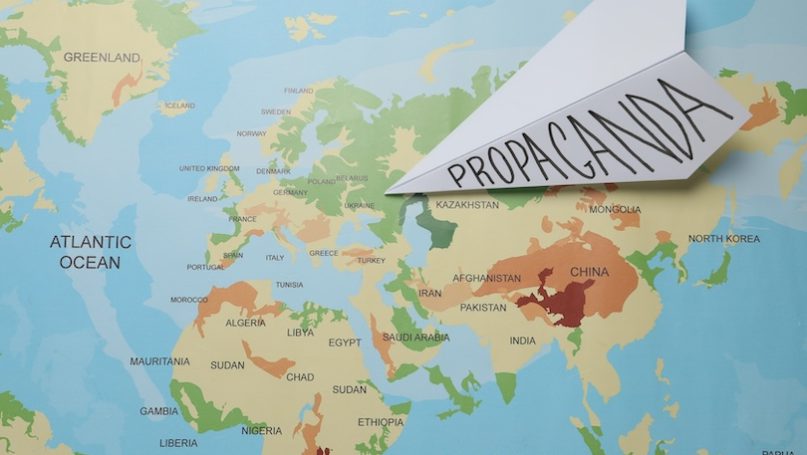Laboratories at Home and Abroad:
Russian Information Operations
Pre-Deployment

The study of Russian information operations has seen an explosion since 2014. This is visible in the number of publications on the topic since that year. To illustrate this point, a quick survey of aggregating platforms of academic journals (JSTOR, Taylor and Francis Online, Google Scholar) is sufficient. Querying the platform JSTOR with the search terms [“Russia” “information operations”] produces 169 publications overall, only 40 of which were published before 2014. The platform Taylor and Francis Online produces 19 publications corresponding to this search term with a publication date up to 2014, and 40 overall. Google Scholar produces 628 results published before 2014, and 2200 overall.[1] Furthermore, institutions that specialise in studying, documenting, and counteracting Russian information operations were set up after 2014. The two most notable ones are the NATO Strategic Communications Centre of Excellence (Bentzen, 2016, p. 3) and the East Stratcom Task Force under the European External Action Service (Vilson, 2016, p. 127)
Such an explosion of academic interest is explained by the annexation of Crimea by the Russian Federation in March 2014 (Giles, 2016, p. 2) and the extremely successful informational component that it featured (McIntosh, 2015, pp. 299-300). Russian information operations were studied pre-2014. Examples are the 2007 cyberattacks against Estonia (Lange-Ionatamisvili, 2015, p. 3) and Georgia’s “victory” on the informational front in the 2008 war (Thomas, 2010, pp. 279-282). However, the Crimean operation reshaped the field, producing a streak of multidisciplinary, comprehensive studies between 2014 and 2016.
Following 2016, the field underwent a second shift. The intervention of the Russian special services into the US presidential elections made clear that “hybrid warfare”—including information operations—was more relevant than thought even after Crimea. This operation globalised the scope taken to study Russian information operations. If the US was vulnerable, so was everybody else. As a consequence, regional projects started appearing, investigating Russian information operations in the local language. This led to the splintering of the field geographically, and to the decreased attention to the common trends of Russian information operations, one of the key subjects of the literature around Crimea.
One of these trends is the subject of this dissertation. More precisely, I propose that the internal Russian information space is used to test narratives before they are deployed in Russian information operations. Such a mechanism would be especially effective against the countries of the post-Soviet space. These states are typically more vulnerable to Russian information operations due to the presence of ethnic minorities, as well as a shared historical memory with Russia that is easy to exploit for manipulative purposes.
To explore the viability of this hypothesis, I will present the case of the Richard Lugar Center for Public Health Research (Lugar Lab) in Tbilisi, Georgia. During the COVID-19 crisis in 2020, a narrative was deployed first in Russia and then in Georgia, alleging the involvement of the laboratory in the creation and spreading of the COVID-19 virus as part of US biological warfare against Russia. Through a detailed analysis of this case, I hope to illustrate the theory of the Russian information space as a testing ground for information operations. I use the term “information operations” throughout the dissertation because it is inclusive of everything that might form part of such an operation from Russia. Information operations in the Russian understanding include everything from network-based activities, influence campaigns, intelligence, economic activities, deception, elite corruption, special operations, etc. (Giles, 2016), and are aimed at altering the public consciousness of the adversary populations in ways advantageous to Russia. Despite the shift away from such terminology in Western literature after 2016, I deem it useful, as it provides the necessary scope to understand operations as a whole.
In the following section, I will summarise the key features of post-Crimea literature to highlight the more substantial attention paid to the general understanding of Russian information operations. Following the 2016 shift within the field, I will narrow my focus to the studies that make the connection between the Russian internal information space and Russian information operations. In order to explore this connection, I will elaborate on my hypothesis. The similarity of methods between Russian internal informational control and Russian information operations, administrative ties, and the logical rationale behind testing narratives before deploying them abroad represent the key elements. To highlight how this mechanism of testing might operate, the case of the Lugar Lab will serve as an example.
The aim of this dissertation is not to prove conclusively that this mechanism exists. It is to illustrate the potential for conducting further, potentially more quantitative research on this particular question, as well as the general topic of how the Russian information space is used and interacts with Russian information operations. An understanding of these phenomena would undoubtedly aid in detecting, counteracting, or preventing altogether Russian activities that aim to exploit divides within societies to further Russia’s objectives. From the theoretical point of view, the dissertation aims to widen the scope of existing research on the connection between the Russian information space and Russian information operations.
READ ON
Laboratories at Home and Abroad: Russian Information Operations Pre-Deployment (e-ir.info)
No comments:
Post a Comment